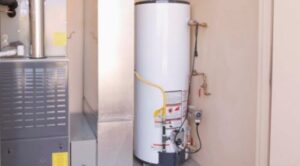Spring Maintenance With Water Heaters
Is spring cleaning nearing the top of your to-do list? At Tureks Plumbing, our Appleton WI Plumber encourages you to include water heater maintenance in your to-do list.
Despite being one of the most crucial pieces of equipment in the home, the water heater is frequently overlooked. We tend to forget this simple appliance that works silently in the nooks and crannies of a garage or closet. That is until there is no hot water.
Why Get Spring Maintenance On Your Water Heater
The good news is that it only takes a few minutes of simple, low-cost maintenance. Additionally, regular maintenance can extend the life of the appliance, saving you the trouble and expense of replacing it prematurely.
Below, our water heater repair Appleton WI shares five quick fixes to keep the hot showers flowing.
Organize
Is your water heater in a utility closet, laundry room, or other location that also serves as a storage area? Depending on what you keep near or around the water heater, this could pose a fire or safety concern. To keep everything clean and safe, follow these steps:
First, our Fox Valley WI Plumber recommends that you clear the area around your water heater. This will allow enough ventilation and an unobstructed view of the unit. If any argument is obscured, you may fail to detect that your water heater is leaking until it is too late. Install shelving and hooks to store laundry detergents and other household objects away from the water heater. Flammable things should be kept at least 18 inches away from the water heater. Also, avoid storing goods prone to moisture damage near the water heater, such as books, papers, or periodicals.
Clean the Vents
Many water heaters feature a vent on the bottom that allows oxygen to enter the heater and aid in heating. Over a year, this vent can collect dust and other debris. To clean, suck up the material with a vacuum and empty up the flue. Vacuum the ducts as part of your spring and fall cleaning routines.
Test TPR
A temperature and pressure relief (TPR) valve is a safety feature in water heaters. It automatically opens to release pressure by detecting harmful pressure accumulation or an abnormally high temperature inside the water heater tank. A water heater is at risk of exploding if the TPR valve is not operating. The TPR valve on a water heater should be tested once a year.
To conduct the test, place a bucket beneath the pipe attached to the TPR. Next, pull the valve’s lever. You should notice a little surge of air or see some water and vapor depart the TPR. If you don’t, the valve will need to be replaced.
Empty the Tank
Sediment buildup in the tank can lower the energy efficiency of your water heater and block your water lines. We recommend you empty the tank in your water heater once a year.
Change the Temperature
Adjust the temperature dial on the water heater tank to 120 degrees. You will save up to 5% on energy bills for every 10 degrees you reduce the temperature. If you will be away from home for more than three days, turn off the water heater or set the thermostat to the lowest level.
You may relax and enjoy the excellent hot water that will be flowing and heating more efficiently — and safely — after just a few minutes of simple labor.
Make a Service Call
If you’re concerned that your attempts at water heater maintenance may backfire and cause more problems than they solve, don’t just disregard the work. Schedule a service call from a plumber near me instead.
At Tureks Plumbing, our terrific people are proud to offer terrific service to our customers. Contact our team today to schedule your water heater maintenance appointment.


